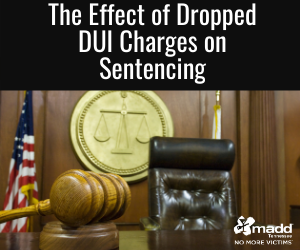The Effect on Sentencing When Prior DUI Charges Are Dropped

Meet John Doe. John was convicted of his first, second, and third DUIs which, under current Tennessee law, were each considered misdemeanors. Then he was arrested for his fourth DUI which is a charge that carries the weight of a Class E Felony. (Tenn. Code Ann. § 55-10-402) If convicted, among other penalties, the corresponding sentence for his fourth DUI would mean John must serve between a minimum of 150 consecutive days and a maximum of 1-2 years as a Range I, Class E offender. John is a Range I offender because this is his first felony conviction. (Tenn. Code Ann. § 40-35-105)
However, after he is convicted of his fourth DUI, John is arrested and charged with his fifth DUI, a Class D felony (Tenn. Code Ann. § 55-10-402) for which the penalty includes a minimum of 150 consecutive days to serve and a maximum of 2-4 years as a Range I offender. (Tenn. Code Ann. § 40-35-105) John’s maximum sentence potential increased for this DUI because it is a Class D felony even though he is still considered a Range I offender. Offenders are considered Range I if they have 0-1 prior felony convictions.
Unfortunately, John gets a sixth DUI, a Class C felony (Tenn. Code Ann. § 55-10-402). Because he now has two previous felony convictions, he is considered a Multiple Offender which bumps him up to sentencing in Range II. (Tenn. Code Ann. § 40-35-106) As a Class C, Range II offender, among other penalties, his sentence will be between a minimum of 150 consecutive days and a maximum of 6-10 years.
This is how the justice system is intended to work in Tennessee. For each subsequent DUI charge, there are meant to be increasing penalties to hold offenders accountable for their choices to continue to drive impaired. But in reality, most offenders who are convicted of a felony DUI charge have actually had far more than four DUIs. Frequently, pleas are granted for first, second and third DUIs to reduce first DUI charges to reckless driving and to reduce second and third DUIs to first or second DUIs.
By the time someone is charged with a fourth DUI, they have demonstrated a clear pattern of disregard for the law and those it is intended to protect. Most courts and prosecutors understand this and take felony DUI fourth charges seriously.
However, MADD has learned that in Davidson County, this is not the case in Judge Gale Robinson’s courtroom where repeat offenders in his Recovery Court are having felony DUI charges erased from their records. What’s worse is that Davidson County District Attorney General, Glenn Funk, approves.
When felony DUI charges are dropped, it puts repeat offenders back on the streets and reduces what the court is allowed to sentence for any future DUI arrests. If a subsequent Vehicular Homicide or Vehicular Assault occurs, past dropped DUI charges reduce the number of prior DUIs in the eyes of the court. This can affect whether or not the term “Aggravated” can be applied to the crime – a term intended to make the potential penalties even more severe.
Driving under the influence of alcohol or drugs is a choice that endangers the lives of innocent people. We are angered that felony DUIs are not being treated as the serious crimes they are in this Davidson County courtroom.
For more information, see Newschannel 4’s investigative report, “DA’s office making deals that erase DUI charges.”
